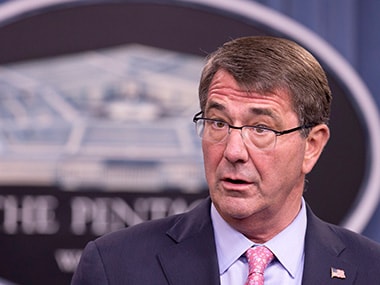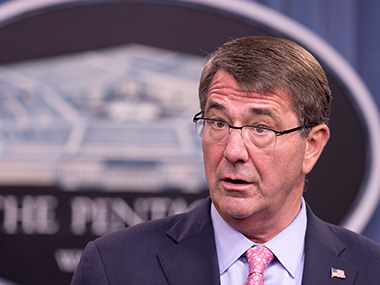Washington: Defense Secretary Ash Carter says the Defense Department “deeply regrets the loss of innocent lives” from a U.S. military airstrike on a hospital in Afghanistan. Responding to what officials said was an Afghan request, a U.S. gunship on Saturday fired on a medical clinic run by Doctors Without Borders in Kunduz. Afghans are battling to recapture the city from the Taliban. More than 20 people have died from the airstrike and dozens were wounded. Carter issued a statement from Rome, saying the U.S. military “takes the greatest care” to prevent civilian casualties “and when we make mistakes we own up to them. That’s exactly what we’re doing right now.” Earlier Tuesday, the top commander in Afghanistan told Congress the airstrike was a mistake. [caption id=“attachment_2458112” align=“alignleft” width=“380”]
 US Defense Secretary Ash Carter/ AP[/caption] The strike wasn’t sought by U.S. forces, Gen. John F. Campbell said at a hastily arranged Pentagon news conference. “We have now learned that on Oct. 3, Afghan forces advised that they were taking fire from enemy positions and asked for air support from U.S. forces,” Campbell said. “An airstrike was then called to eliminate the Taliban threat and several civilians were accidentally struck. This is different from the initial reports, which indicated that U.S. forces were threatened and that the airstrike was called on their behalf.” The clinic was operated by the medical charity Doctors Without Borders. The attack killed at least 22 people and wounded dozens more, setting the hospital on fire. In response to Campbell’s remarks, the organization’s general director, Christopher Stokes, said the U.S. had admitted that it attacked the facility. “The U.S. military remains responsible for the targets it hits, even though it is part of a coalition,” Stokes said. “There can be no justification for this horrible attack. With such constant discrepancies in the U.S. and Afghan accounts of what happened, the need for a full transparent independent investigation is ever more critical.” AP
US Defense Secretary Ash Carter/ AP[/caption] The strike wasn’t sought by U.S. forces, Gen. John F. Campbell said at a hastily arranged Pentagon news conference. “We have now learned that on Oct. 3, Afghan forces advised that they were taking fire from enemy positions and asked for air support from U.S. forces,” Campbell said. “An airstrike was then called to eliminate the Taliban threat and several civilians were accidentally struck. This is different from the initial reports, which indicated that U.S. forces were threatened and that the airstrike was called on their behalf.” The clinic was operated by the medical charity Doctors Without Borders. The attack killed at least 22 people and wounded dozens more, setting the hospital on fire. In response to Campbell’s remarks, the organization’s general director, Christopher Stokes, said the U.S. had admitted that it attacked the facility. “The U.S. military remains responsible for the targets it hits, even though it is part of a coalition,” Stokes said. “There can be no justification for this horrible attack. With such constant discrepancies in the U.S. and Afghan accounts of what happened, the need for a full transparent independent investigation is ever more critical.” AP
Afghan hospital bombing was a 'mistake', says US
FP Archives
• October 7, 2015, 03:48:10 IST
The top commander in Afghanistan told US Congress the airstrike on an Afghan hospital in Kunduz was a mistake.
Advertisement
)